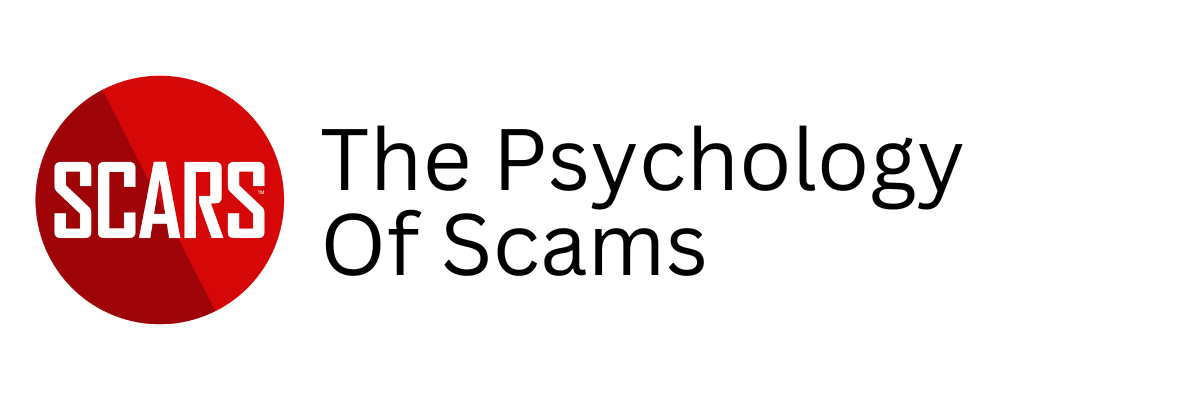Helping Scam Victims To See Through Authority Bias To Expose The Scammers And Fraudsters For What They Are
A Method to Allow Scam Victim Interventions
A SCARS Insight for Banks, Financial Institutions, and Other Enterprises
Authors:
• Debby Montgomery Johnson – Former Banker, Victims’ Advocate, Keynote Speaker, Trainer, Podcast Host, Board Chair of the Society of Citizens Against Relationship Scams Inc.
• Tim McGuinness, Ph.D. – Anthropologist, Scientist, Director of the Society of Citizens Against Relationship Scams Inc.
About This Article
In the fight against financial fraud and scams, the deceptive cloak of authority often blinds victims, leading them into traps laid by cunning fraudsters. However, there’s hope in empowering individuals to see through these veils of deception. By understanding and addressing authority bias, banks, and businesses can intervene effectively during scams.
Utilizing “in-the-moment prompting,” real-time cues provoke critical thinking and hesitation, disrupting fraudsters’ narratives. Through technology integration and education, institutions empower customers to discern reality from illusion.
Open communication enables collaboration, where reporting fraud is encouraged without fear and scam victim blaming.
As institutions prioritize customer protection and empowerment, they dismantle the authority bias foundation that scammers exploit. This holistic approach fortifies defenses against financial fraud and cultivates a safer, more empowered financial landscape for their customers.

Unmasking Authority Bias: How Banks Or Anyone Can Empower Scam Victims to See Through Scammers’ Or Fraudsters’ Deception
Scammers and fraudsters often impersonate the cloak of authority to manipulate their scam victims.
With cunning deceptive and persuasive tactics, they construct a web of lies, exploiting trust and leveraging their perceived power. Yet, amidst the tangle of deceit, lies an opportunity for banks and others to empower their customers, to help them see through the veil of ‘authority bias‘, and reclaim control of their agency and financial security.
Authority Bias
Authority bias, a cognitive bias wherein individuals tend to attribute greater credibility and trustworthiness to those perceived as authority figures, serves as fertile ground for fraudsters to sow their seeds of deception. Whether posing as bank officials, government representatives, or tech support agents, these impostors wield authority like a weapon, coercing victims into compliance and perpetuating their nefarious schemes.
‘In-The-Moment Prompting’
However, the battle against fraudsters and scammers is not lost. By implementing strategic interventions that disrupt authority bias during a scam, banks and anyone can equip their customers with the tools to discern reality from illusion. One such approach involves the integration of in-the-moment prompts designed to provoke critical thinking and instill doubt in the minds of potential victims.
Imagine a scenario where a customer receives a call from someone claiming to be a bank representative, urging them to disclose sensitive information for urgent verification purposes. Instead of succumbing to blind obedience, the customer is met with a prompt from their banking app, questioning the legitimacy of the call and encouraging skepticism. This simple intervention acts as a beacon of clarity amidst the fog of deception, prompting the customer to pause, reflect, and reconsider their actions.
Furthermore, banks can leverage technology to enhance the effectiveness of these prompts, utilizing artificial intelligence and machine learning algorithms to identify suspicious patterns and preemptively intervene before a scam unfolds. By analyzing call metadata, detecting anomalies in communication patterns, and cross-referencing with known scam tactics, banks can proactively alert customers to potential threats and fortify their defenses against fraudsters.
More About ‘In-The-Moment Prompting’
“In-the-moment prompting” is an intervention technique aimed at helping scam victims break free from the influence of scammers or fraudsters by providing real-time prompts or cues designed to provoke critical thinking and instill doubt during a scam attempt. This technique leverages the immediacy of the situation to disrupt cognitive biases, such as authority bias, and empower individuals to make more informed decisions.
Here’s how it works:
- Real-time Intervention: In-the-moment prompting occurs during the actual interaction between the victim and the scammer. This could take various forms, such as a popup notification on a banking app, an automated message during a phone call, or a warning banner on a website.
- Prompts for Critical Thinking: The prompts are carefully crafted to encourage the victim to question the legitimacy of the situation and reconsider their actions. They may include questions like, “Is this request typical of my bank’s procedures?” or statements like, “Be cautious of providing personal information over the phone.”
- Instilling Doubt: By introducing doubt into the victim’s mind, the prompts disrupt the smooth progression of the scam and create a moment of hesitation. This pause gives the victim an opportunity to reassess the situation more objectively and potentially recognize signs of deception.
- Empowering Decision-Making: Ultimately, the goal of in-the-moment prompting is to empower the victim to make a more informed decision about how to proceed. By providing timely guidance and support, banks and other organizations can help individuals resist manipulation and protect themselves from falling victim to scams.
- Technology Integration: In modern implementations, technology plays a crucial role in delivering in-the-moment prompts effectively. Machine learning algorithms can analyze various signals, such as communication patterns, caller metadata, and transaction history, to detect suspicious activity and trigger the appropriate prompts.
Overall, in-the-moment prompting represents a proactive approach to combating fraud by leveraging technology and psychology to empower individuals in real time. By disrupting cognitive biases and fostering critical thinking, this intervention technique helps scam victims break free from the influence of fraudsters and safeguard their financial security.
Examples of In The Moment Questions
Here are examples of in-the-moment questions that a bank or business could ask scam victims to prompt critical thinking and instill doubt:
- Is this request for information coming from a familiar source?
- Does the caller’s tone or urgency seem unusual for a typical banking interaction?
- Have you received unsolicited communication asking for personal or financial information before?
- Are there any discrepancies between the caller’s information and what you know about your account?
- Have you ever been asked to verify your identity in this manner by your bank?
- Is there a legitimate reason why your bank would need this information right now?
- Can you verify the identity of the caller through an official channel?
- Are you being pressured to make a decision or take action quickly?
- Have you received any warnings or alerts about potential scams recently?
- Does the caller seem overly insistent or aggressive in their approach?
- Are there any red flags in the language or phrasing used by the caller?
- Have you had any recent changes to your account that might prompt this request?
- Is the caller asking for information that is readily available to them through other means?
- Have you been asked to provide sensitive information over the phone or via email before?
- Can you verify the legitimacy of the request through an alternative communication channel?
- Is there an option to defer the request until you can verify its authenticity?
- Have you received any notifications about suspicious activity on your account recently?
- Is the caller offering a solution to a problem you weren’t previously aware of?
- Are there any unusual or unexpected charges or transactions on your account?
- Can you consult with a trusted individual or advisor before proceeding?
- Does the caller seem knowledgeable about your personal or financial situation?
- Have you noticed any unusual behavior or activity on your devices or accounts?
- Are there any official protocols or procedures that the caller should be following?
- Can you confirm the identity of the caller through security questions or other means?
- Does the request align with your typical banking experience and expectations?
The critical element in this process is to ask a question and wait for a response. It can take several questions before the victim begins to suspect, and that usually will emerge as a cognitive dissonance (that may appear to be frustration). But when they reach that point, it is because a part of the brain is asking questions.
These questions are designed to prompt individuals to pause, reflect, and assess the legitimacy of the situation before proceeding, helping to protect them from falling victim to scams.
In-Depth Scam & Fraud Education
Just as important, education plays a pivotal role in undermining authority bias and arming individuals with the knowledge to recognize and resist manipulation. Banks and others can offer comprehensive training programs and resources that educate customers about common scam tactics, highlight red flags to watch out for, and provide guidance on how to verify the authenticity of communication channels.
Who the source is behind these trainings is critical. Just having some knowledge about scams and fraud is not enough. It takes true experts in the scam victims’ psychological experience, such as SCARS, to help financial institutions craft the educational material and training.
Open Honest Customer Communication
Additionally, creating a culture of open communication and transparency between banks and their customers can further erode the foundation of authority bias. This requires banks to be honest about the risks and vulnerabilities of their processes and technologies too. Encouraging customers to report suspicious activities without fear of judgment or repercussion creates a collaborative ecosystem where vigilance is celebrated, and fraudsters are thwarted at every turn. It is also vital that banks and others make it very easy to report fraud without judgment or victim blaming. Learn more about scam victim blaming at www.EndScamVictimBlaming.org
Summary
In the ongoing battle against financial fraud and scams, undermining authority bias represents a crucial step toward empowering individuals to protect themselves and their assets. By implementing strategic interventions, leveraging technology, prioritizing education, and creating open communication, banks, financial institutions, and other enterprises can tilt the scales in favor of their customers, dismantling the facade of authority that scammers and fraudsters rely upon and ushering in an era of safer financial security and empowerment.
-/ 30 /-
What do you think about this?
Please share your thoughts in a comment below!
More Banking Related Information:
- 3 Smart Bank Strategies to Stop Scams (scamsnow.com)
- A Proposal from SCARS to Reduce Bank Wire/Money Transfer Fraud (scamsnow.com)
- Bank Customer Interventions (scamsnow.com)
- Cognitive Biases: Authority Bias – 2024 (romancescamsnow.com)
- Cognitive Biases Catalog 2024 (romancescamsnow.com)
- Family Takes Legal Action Against Banks After Navy Veteran Loses $3.6 Million in Wire Fraud Scheme (scamsnow.com)
- Crypto Scams – Lloyds Bank Issues Urgent Warning Over Rising Threat – 2023 (scamsnow.com)
-/ 30 /-
What do you think about this?
Please share your thoughts in a comment below!
SCARS LINKS: AgainstScams.org RomanceScamsNOW.com ContraEstafas.org ScammerPhotos.com Anyscam.com ScamsNOW.com
reporting.AgainstScams.org support.AgainstScams.org membership.AgainstScams.org donate.AgainstScams.org shop.AgainstScams.org
youtube.AgainstScams.org linkedin.AgainstScams.org facebook.AgainstScams.org
5 Comments
Leave A Comment
TABLE OF CONTENTS
- A Method to Allow Scam Victim Interventions
- About This Article
- Unmasking Authority Bias: How Banks Or Anyone Can Empower Scam Victims to See Through Scammers’ Or Fraudsters’ Deception
- Authority Bias
- ‘In-The-Moment Prompting’
- More About ‘In-The-Moment Prompting’
- Examples of In The Moment Questions
- In-Depth Scam & Fraud Education
- Open Honest Customer Communication
- Summary
- More Banking Related Information:
CATEGORIES
![NavyLogo@4x-81[1] Helping Scam Victims To See Through Authority Bias To Expose The Scammers And Fraudsters For What They Are - 2024](https://scamsnow.com/wp-content/uploads/2025/04/NavyLogo@4x-811.png)
ARTICLE META
Important Information for New Scam Victims
- Please visit www.ScamVictimsSupport.org – a SCARS Website for New Scam Victims & Sextortion Victims.
- SCARS Institute now offers its free, safe, and private Scam Survivor’s Support Community at www.SCARScommunity.org – this is not on a social media platform, it is our own safe & secure platform created by the SCARS Institute especially for scam victims & survivors.
- SCARS Institute now offers a free recovery learning program at www.SCARSeducation.org.
- Please visit www.ScamPsychology.org – to more fully understand the psychological concepts involved in scams and scam victim recovery.
If you are looking for local trauma counselors, please visit counseling.AgainstScams.org
If you need to speak with someone now, you can dial 988 or find phone numbers for crisis hotlines all around the world here: www.opencounseling.com/suicide-hotlines
Statement About Victim Blaming
Some of our articles discuss various aspects of victims. This is both about better understanding victims (the science of victimology) and their behaviors and psychology. This helps us to educate victims/survivors about why these crimes happened and not to blame themselves, better develop recovery programs, and help victims avoid scams in the future. At times, this may sound like blaming the victim, but it does not blame scam victims; we are simply explaining the hows and whys of the experience victims have.
These articles, about the Psychology of Scams or Victim Psychology – meaning that all humans have psychological or cognitive characteristics in common that can either be exploited or work against us – help us all to understand the unique challenges victims face before, during, and after scams, fraud, or cybercrimes. These sometimes talk about some of the vulnerabilities the scammers exploit. Victims rarely have control of them or are even aware of them, until something like a scam happens, and then they can learn how their mind works and how to overcome these mechanisms.
Articles like these help victims and others understand these processes and how to help prevent them from being exploited again or to help them recover more easily by understanding their post-scam behaviors. Learn more about the Psychology of Scams at www.ScamPsychology.org
SCARS INSTITUTE RESOURCES:
If You Have Been Victimized By A Scam Or Cybercrime
♦ If you are a victim of scams, go to www.ScamVictimsSupport.org for real knowledge and help
♦ SCARS Institute now offers its free, safe, and private Scam Survivor’s Support Community at www.SCARScommunity.org/register – this is not on a social media platform, it is our own safe & secure platform created by the SCARS Institute especially for scam victims & survivors.
♦ Enroll in SCARS Scam Survivor’s School now at www.SCARSeducation.org
♦ To report criminals, visit https://reporting.AgainstScams.org – we will NEVER give your data to money recovery companies like some do!
♦ Follow us and find our podcasts, webinars, and helpful videos on YouTube: https://www.youtube.com/@RomancescamsNowcom
♦ Learn about the Psychology of Scams at www.ScamPsychology.org
♦ Dig deeper into the reality of scams, fraud, and cybercrime at www.ScamsNOW.com and www.RomanceScamsNOW.com
♦ Scam Survivor’s Stories: www.ScamSurvivorStories.org
♦ For Scam Victim Advocates visit www.ScamVictimsAdvocates.org
♦ See more scammer photos on www.ScammerPhotos.com
You can also find the SCARS Institute’s knowledge and information on Facebook, Instagram, X, LinkedIn, and TruthSocial
Psychology Disclaimer:
All articles about psychology and the human brain on this website are for information & education only
The information provided in this and other SCARS articles are intended for educational and self-help purposes only and should not be construed as a substitute for professional therapy or counseling.
Note about Mindfulness: Mindfulness practices have the potential to create psychological distress for some individuals. Please consult a mental health professional or experienced meditation instructor for guidance should you encounter difficulties.
While any self-help techniques outlined herein may be beneficial for scam victims seeking to recover from their experience and move towards recovery, it is important to consult with a qualified mental health professional before initiating any course of action. Each individual’s experience and needs are unique, and what works for one person may not be suitable for another.
Additionally, any approach may not be appropriate for individuals with certain pre-existing mental health conditions or trauma histories. It is advisable to seek guidance from a licensed therapist or counselor who can provide personalized support, guidance, and treatment tailored to your specific needs.
If you are experiencing significant distress or emotional difficulties related to a scam or other traumatic event, please consult your doctor or mental health provider for appropriate care and support.
Also read our SCARS Institute Statement about Professional Care for Scam Victims – click here
If you are in crisis, feeling desperate, or in despair, please call 988 or your local crisis hotline – international numbers here.
More ScamsNOW.com Articles
A Question of Trust
At the SCARS Institute, we invite you to do your own research on the topics we speak about and publish. Our team investigates the subject being discussed, especially when it comes to understanding the scam victims-survivors’ experience. You can do Google searches, but in many cases, you will have to wade through scientific papers and studies. However, remember that biases and perspectives matter and influence the outcome. Regardless, we encourage you to explore these topics as thoroughly as you can for your own awareness.

























![scars-institute[1] Helping Scam Victims To See Through Authority Bias To Expose The Scammers And Fraudsters For What They Are - 2024](https://scamsnow.com/wp-content/uploads/2025/04/scars-institute1.png)

![niprc1.png1_-150×1501-1[1] Helping Scam Victims To See Through Authority Bias To Expose The Scammers And Fraudsters For What They Are - 2024](https://scamsnow.com/wp-content/uploads/2025/04/niprc1.png1_-150x1501-11.webp)
I love this in-the-moment thinking. The above questions could help in so many situations, bank-related and not. The pause needed to activate critical thinking is vital. Criminals are very adept at keeping you off-balance by their sense of urgency. I wish all banks and other institutions would strive to educate their customers and collaborate with them to help mitigate many types of fraud.
No one should ever have to make a split second decision on a financial matter, I don’t care what it is. The obvious choice to me is to get a more informed person to run this by so that you can have the benefit of someone not involved in the matter to look at the situation. Maybe it would be helpful to share this with a banker even. Just don’t be pressured to do something without some careful thought.
Thank you for this post today. It is a great reminder.
I agree with the combined effort of technology and in the moment questions to help people slow down and consider before rushing out to comply with a scam request. I remember the day last September as I was sitting in the bank, confirming activity I had found in my accounts, getting more information and asking questions, I was getting text after text and emails regarding accounts that had been opened in my name in the matter of minutes. I was sitting with the head of the bank’s fraud team as well. SHE was highly critical of what was happening, of my emotions and believed as Citi did that I had set up transfers to pay my Citi bill but added too many zeroes and I forgot about it. I felt humiliated and terribly unsupported by my bank. Yes the bank had a fraud team but they were handling it as though their client was at fault instead of being helpful, or offering comments that would help me to settle down instead of feeling I had to defend myself. The bank’s policy was to cover the amount of money that transferred from my account. But it should not have been their policy to shame me. That said, I do agree that banking institutions should participate in an effort to encourage their clients to STOP, BREATHE, CONSIDER before proceeding with any transaction that is out of normal business. I do agree that financial professionals in banks, or investment houses and more should have training such as what SCARS offers because it will be a more informed approach they can extend to their customers rather than putting their customer on the defensive. Another area that could be a potential win in education would be to have training classes at assisted living facilities, libraries, or area agencies on aging offices.
It would be great if banks implemented in-the-moment questions, many crimes could be prevented.
Sadly, all we can do is to develop solutions and publish them in the hope that these institutions will integrate them into their processes.